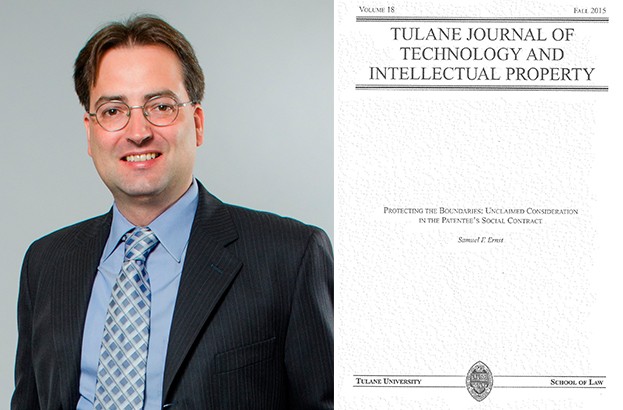
Fowler School of Law Professor Sam Ernst Publishes “Protecting the Boundaries: Unclaimed Consideration in the Patentee’s Social Contract”
January 28, 2016
Chapman University Dale E. Fowler School of Law Professor Sam Ernst’s article “
Protecting the Boundaries: Unclaimed Consideration in the Patentee’s Social Contract
” was published in Volume 18 of the
Tulane Journal of Technology & Intellectual Property
.
From the abstract:
This article argues that the primary value society receives in the patentee’s social contract is not new inventions, but “unclaimed consideration.” Unclaimed consideration takes many forms: additional innovations to improve on the patented invention; additional innovations created through efforts to design around the patented invention; innovations created by losers in the patent race; innovations informed by the unclaimed technical information in patents; commercialization of the patented invention or these other innovations; and the signals that patents give to investors regarding the value of a company or research lab. This unclaimed consideration is not necessarily a positive externality or “spillover,” because the inventor herself may well capture the value of the unclaimed consideration. And while there are many schools of patent scholarship engaged in spirited debate regarding how patents serve (or fail to serve) society, this article is the first to recognize and map the growing consensus among modern patent theories that this unclaimed consideration is of primary value and importance to society. Indeed the majority of claimed inventions are never commercialized or licensed, and so granting the patent monopoly in most cases can only be justified by society receiving some other form of consideration. The courts should therefore guard the boundaries of patent claims to avoid the perverse result of allowing the thicket of claimed inventions to stifle the development of unclaimed consideration. The article demonstrates this point through a case study of Siemens Medical Solutions v. Saint-Gobain Ceramics & Plastics, in which the Federal Circuit decided that an accused product can equivalently infringe a patent even after it is declared by the Patent and Trademark Office to be separately patentable and non-obvious over the asserted patent. The majority of a sharply divided court thereby allowed a broad doctrine of equivalents to ensnare unclaimed consideration, relying on reasoning myopically wed to the belief that the sole way in which the patent laws promote progress is by incentivizing claimed inventions. The courts should instead lean on the side of protecting unclaimed consideration, which modern patent theory recognizes is the substantial return society ought to receive in return for the patent grant.
Professor Ernst
teaches in the areas of intellectual property, contracts and civil litigation practice, with scholarship that focuses on patent law. Prior to joining the Fowler School of Law in 2013, Professor Ernst was a partner at the international law firm of Covington & Burling in San Francisco, practicing intellectual property, commercial and appellate litigation, while maintaining an active pro bono practice focusing on veterans disability recovery and homeless advocacy. In 2010, he was recognized by the Federal Circuit Bar Association for his work on behalf of veterans. In 2006 and 2008, he received a Certificate of Excellence from the Berkeley Food and Housing Project. Professor Ernst also taught pre-trial civil litigation at the UC Berkeley School of Law. He earned his JD
magna cum laude
from Georgetown University Law Center. He has a bachelor’s degree in Modern Literary Studies from UC Santa Cruz and a master’s degree in Comparative Literature from UCLA. Other recent articles include “
Of Printer Cartridges and Patent Exhaustion: The En Banc Federal Circuit is Poised to Clarify Quanta
” and “
The Federal Circuit’s New ‘Authorized Aquirer’ Restriction on Patent Exhaustion
,” both published in 2015 on Patently-O, the nation’s leading patent blog; and “
Patent Exhaustion for the Exhausted Defendant: Should Parties be Able to Contract Around Exhaustion in Settling Patent Litigation
,” published in 2014 in the
Illinois Journal of Law, Technology & Policy
.
